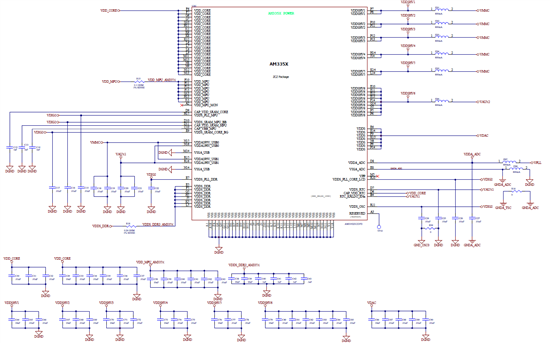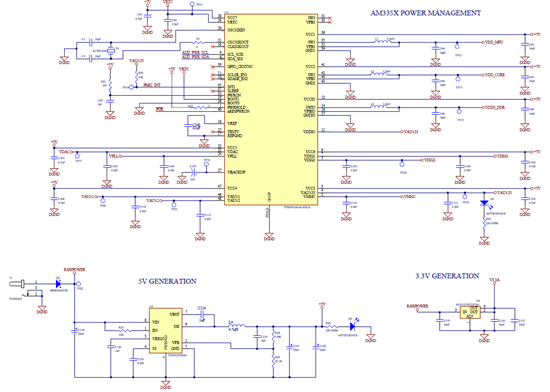We have a custom board that houses an AM3352 720MHz, i have swapped one out with an AM3352 1GHz because it was requested we move up to the faster model. I am having issues getting this working though. Are there some changes i need to make to support this faster processor?
We are using the kernel/U-boot based of version 6 of the SDK, so Kernel version 3.2.
U-boot works great, i can stop and do mtest and stuff to the NAND and everything seems to work fine, but when the kernel boots it gets to "Uncompressing Linux..." and then just stops until the watchdog enabled by U-Boot resets it after 30 seconds.
U-Boot SPL 2013.01.01-hg5966303f72d5-dirty (Sep 17 2014 - 10:30:57)
MPU 1000
VOLT 2
musb-hdrc: ConfigData=0xde (UTMI-8, dyn FIFOs, bulk combine, bulk split, HB-ISO Rx, HB-ISO Tx, SoftConn)
musb-hdrc: MHDRC RTL version 2.0
musb-hdrc: setup fifo_mode 4
musb-hdrc: 28/31 max ep, 16384/16384 memory
USB Peripheral mode controller at 47401000 using PIO, IRQ 0
musb-hdrc: ConfigData=0xde (UTMI-8, dyn FIFOs, bulk combine, bulk split, HB-ISO Rx, HB-ISO Tx, SoftConn)
musb-hdrc: MHDRC RTL version 2.0
musb-hdrc: setup fifo_mode 4
musb-hdrc: 28/31 max ep, 16384/16384 memory
USB Host mode controller at 47401800 using PIO, IRQ 0
U-Boot 2013.01.01-hg5966303f72d5-dirty (Sep 17 2014 - 10:30:57)
I2C: ready
DRAM: 256 MiB
WARNING: Caches not enabled
NAND: 512 MiB
MMC: OMAP SD/MMC: 0, OMAP SD/MMC: 1
musb-hdrc: ConfigData=0xde (UTMI-8, dyn FIFOs, bulk combine, bulk split, HB-ISO Rx, HB-ISO Tx, SoftConn)
musb-hdrc: MHDRC RTL version 2.0
musb-hdrc: setup fifo_mode 4
musb-hdrc: 28/31 max ep, 16384/16384 memory
USB Peripheral mode controller at 47401000 using PIO, IRQ 0
musb-hdrc: ConfigData=0xde (UTMI-8, dyn FIFOs, bulk combine, bulk split, HB-ISO Rx, HB-ISO Tx, SoftConn)
musb-hdrc: MHDRC RTL version 2.0
musb-hdrc: setup fifo_mode 4
musb-hdrc: 28/31 max ep, 16384/16384 memory
USB Host mode controller at 47401800 using PIO, IRQ 0
Net: PHY reset timed out
cpsw, usb_ether
Hit any key to stop autoboot: 3 2 1 0
Boot Attempt Number 1
Booting from nand ...
NAND read: device 0 offset 0x200000, size 0xa00000
10485760 bytes read: OK
## Booting kernel from Legacy Image at 80200000 ...
Image Name: Linux-3.2.0-ti2013.12.01
Image Type: ARM Linux Kernel Image (uncompressed)
Data Size: 3194264 Bytes = 3 MiB
Load Address: 80008000
Entry Point: 80008000
Verifying Checksum ... OK
Loading Kernel Image ... OK
OK
Starting kernel ...
Uncompressing Linux...
I know the 1GHz version needs higher voltages, but i checked these and they are being set appropriately, so that's not it. The same Kernel and U-Boot works on the same board with a 720MHz processor.
Is there anything else i need to change like RAM timings for DDR3 or something? I mean U-Boot is working which tells me the RAM stuff is fine. I really am not sure what the problem could be that causes it to fail during Uncompressing.
Any help or suggestions would be greatly appreciated!





